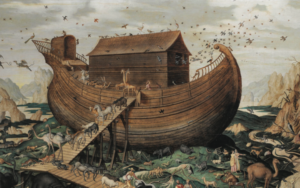
Predicting rain doesn’t count. Building arks does. Buffett wrote this in a Berkshire Hathaway shareholder report from 2001 to explain the big mistake he made that year.
In Buffett’s estimation, Berkshire Hathaway had a terrible year, which was further compounded by the tragic events of September 11th, 2001. Buffett was explaining that he had actually predicted many of the market events that happened before that fateful day, but he “didn’t convert thought to action” as he wrote, thus violating the Noah rule (the rain came
as he expected but he hadn’t built an ark).
The essence of Noah’s rule is that we need to inject some sort of Bayesian practicality into how we think, plan and execute things. You are all vaguely familiar with Bayes’ Theorem – or at least its basic precept – which is that the probability of an event occurring is based on prior knowledge of variables and factors related to that event.
So, in everyday terms, the probability that my flight will leave on time is a function of which day of the week it is, where I am going, which airport I am flying out of and the weather, just to name a few factors. I know this because I have flown thousands of times. In other words, I am using my prior knowledge of factors and variables related to flight departures to help me understand the probability of my flight, on this particular day, actually leaving on time.
Simple, yes?
But nothing in public health is simple. And the COVID-19 pandemic has undoubtedly (re)focused our attention on one of the great, unintentional health lessons of our time. Yes, Bill Gates warned us about the threat of a viral pandemic in his March 2015 TED talk.
And yes, every G7 nation has a ‘pandemic preparedness playbook’ that they constantly review and pass on to new incoming administrations. And, of course, we have brilliant scientists working in research laboratories. Yet here we are in this apocalyptic world of 2020 at the mercy of this virus.
The cold, hard truth is that we didn’t build our ark. The original SARS virus in 2002 was a rain warning. And so was H1N1. And MERS. And Zika. And Ebola.
Every virologist in the world who has spent any amount of time studying zoonotic diseases has been sounding the alarm bells for decades. They have been predicting the rain. And it wasn’t just rain – it was rain in biblical proportions, they told us. We nodded. We said we understood. But we didn’t.
Now the time for predictions is over. Now is the time that we really need to get down to the business of building arks. Do we really need to predict that there is going to be another pandemic in 20 or 30 years? Let’s plan to do something about it based on our knowledge of prior events related to this pandemic.
If it happens (which is likely), we’re ready. If it doesn’t, no harm done. Let’s stop with predicting whether some misinformation or disinformation is going to break down the trust in the dozens of vaccines that are sure to arrive and let’s assume it’s going to happen based on what we know about both anti-vaxxers and social media misinformation in the 21st century.
Let’s build an ark for that right now. If it happens (which is likely), we’re ready. If it doesn’t happen, it doesn’t happen. Either way, we’ve got the ark built for that scenario. Let’s stop predicting that developing the vaccine is hard but that manufacturing and distributing it is going to be even harder.
If we know that we need everything from glass vials, to a cold chain strategy to enough needles and syringes, let’s get on it. Now. Today. Build the ark. Appropriate the government funding. Get the private sector involved. Do whatever is needed.
For too long we have been great at predicting what can and will happen in public health. But we have failed miserably at building the ark. We have surrounded ourselves with sacred cows and cocooned ourselves in obvious echo chambers.
The solutions to public health’s biggest problems, to be sure, are more complex than an aphorism from 20 years ago buried in the pages of some shareholder’s report.
We need disciples committed to the cause. We need money. We need political will. We need luck, patience and hard work. We need to be bold and take risks. But most of all, we need to learn to live with the rain.
He told us about it almost two decades ago – we didn’t pay attention
This article was originally published here.